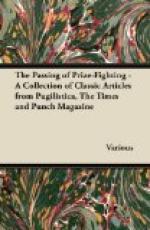When I left her, Celia had two photographs, a British warm and an accidental coffee-stain, by which to remember me. The coffee-stain was the purest accident. By her manner of receiving it, Celia gave me the impression that she thought I had done it on purpose, but it was not so. The coffee-cup slipped-in-me-’and-mum, after which the law of gravity stepped in, thus robbing what would have been a polite deed of most of its gallantry. However, I explained all that at the time. The fact remains that, in whatever way you look at it, I had left my mark. Celia was not likely to forget me.
But she was determined to make sure. No doubt mine is an elusive personality; take the mind off it for one moment and it is gone. So I was to be perpetuated in a miniature.
“Can it be done without a sitting?” I asked doubtfully. I was going away on the morrow.
“Oh, yes. It can be done from the photographs easily. Of course I shall have to explain your complexion and so on.”
“May I read the letter when you’ve explained it?”
“Certainly not,” said Celia firmly.
“I only want to make sure that it’s an explanation and not an apology.”
“I shall probably put it down to a bicycle accident. Which is that?—No, no,” she added hastily, “Kamerad!”
I put down the revolver and went on with my packing. And a day or two later Celia began to write about the miniature.
* * * * *
The stars represent shells or months, or anything like that; not promotion. I came back with just the two—one on each sleeve.
We talked of many things, but not of the miniature. Somehow I had forgotten all about it. And then one day I remembered suddenly.
“The miniature,” I said; “did you get it done?”
“Yes,” said Celia quietly.
“Have you got it here?”
“Yes.”
“Oh, I say, do let me see it.”
Celia hesitated.
“I think we had better wait till you are a little stronger,” she said very gently.
“Is it so very beautiful?”
“Well—”
“So beautiful that it almost hurts? Celia, dear, let me risk it,” I pleaded.
She fetched it and gave it to me. I gazed at it a long time.
“Who is it?” I asked at last.
“I don’t know, dear.”
“Is it like anybody we know?”
“I think it’s meant to be like you, darling,” said Celia tenderly, trying to break it to me.
I gazed at it again.
“Would you get me a glass?” I asked her.
“A looking-glass, or with brandy and things in it?”
“Both ... Thank you. Promise me I don’t look like this.”
“You don’t,” she said soothingly.
“Then why didn’t you tell the artist so and ask him to rub it out and do it again?”
Celia sighed.
“He has. The last was his third rubbige.”




